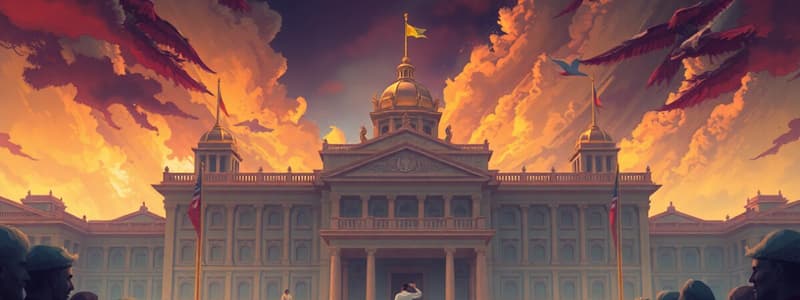Podcast
Questions and Answers
What authority does Congress have in terms of appropriations?
What authority does Congress have in terms of appropriations?
- To allocate tax money for public spending (correct)
- To enforce martial law
- To determine the legislative agenda
- To appoint governors
Which body has the exclusive right to initiate impeachment cases?
Which body has the exclusive right to initiate impeachment cases?
- House of Senate
- Executive Branch
- House of Representatives (correct)
- Supreme Court
What is required for Congress to declare the existence of war?
What is required for Congress to declare the existence of war?
- Majority vote in the Senate
- Two-thirds vote of both houses in joint session (correct)
- Majority vote in the House of Representatives
- Approval from the President
Which power allows Congress to amend or repeal laws?
Which power allows Congress to amend or repeal laws?
What power is described as the authority to ratify treaties and international agreements?
What power is described as the authority to ratify treaties and international agreements?
What is the minimum age requirement for a Representative in the Philippines on the day of the election?
What is the minimum age requirement for a Representative in the Philippines on the day of the election?
Which of the following is NOT a qualification for a Senator?
Which of the following is NOT a qualification for a Senator?
How long is the term of office for a Senator in the Philippines?
How long is the term of office for a Senator in the Philippines?
What percentage of the total number of representatives in the House of Representatives does the party-list representatives constitute?
What percentage of the total number of representatives in the House of Representatives does the party-list representatives constitute?
What is the main function of a bill before it becomes a law?
What is the main function of a bill before it becomes a law?
What is the primary legislative body in the Philippines comprised of both a Senate and a House of Representatives?
What is the primary legislative body in the Philippines comprised of both a Senate and a House of Representatives?
How many members are there in the Senate of the Philippines?
How many members are there in the Senate of the Philippines?
What must the House of Representatives achieve to overturn a presidential veto?
What must the House of Representatives achieve to overturn a presidential veto?
Which of the following is NOT a listed advantage of bicameralism?
Which of the following is NOT a listed advantage of bicameralism?
Which of the following statements is true regarding the qualifications for citizenship?
Which of the following statements is true regarding the qualifications for citizenship?
Which session of Congress is held to consider specific subjects or legislation as designated?
Which session of Congress is held to consider specific subjects or legislation as designated?
What does legislative power enable Congress to do?
What does legislative power enable Congress to do?
Which statement accurately describes a disadvantage of bicameralism?
Which statement accurately describes a disadvantage of bicameralism?
What is the primary purpose of a bicameral legislature?
What is the primary purpose of a bicameral legislature?
Which of the following represents a composition of the House of Representatives in the Philippines?
Which of the following represents a composition of the House of Representatives in the Philippines?
What is a significant criticism mentioned regarding bicameralism?
What is a significant criticism mentioned regarding bicameralism?
What is the primary purpose of the three branches of government as described in the content?
What is the primary purpose of the three branches of government as described in the content?
How many readings must a bill pass on separate days before it becomes law, as stated in the content?
How many readings must a bill pass on separate days before it becomes law, as stated in the content?
What must occur after the final reading of a bill according to the described process?
What must occur after the final reading of a bill according to the described process?
What is required for a bill to pass if it doesn't meet the standard procedure due to an emergency?
What is required for a bill to pass if it doesn't meet the standard procedure due to an emergency?
What happens if the President vetoes a bill?
What happens if the President vetoes a bill?
Which of the following statements is true regarding the subject of a bill?
Which of the following statements is true regarding the subject of a bill?
What role does the bicameral committee play in the legislative process?
What role does the bicameral committee play in the legislative process?
What is required for members of Congress concerning printed copies of a bill before its passage?
What is required for members of Congress concerning printed copies of a bill before its passage?
What action can Congress take to counter a presidential veto?
What action can Congress take to counter a presidential veto?
How can the executive branch influence the legislative branch?
How can the executive branch influence the legislative branch?
What authority does the legislative branch have over judicial nominations?
What authority does the legislative branch have over judicial nominations?
What is one power the judiciary has over legislative actions?
What is one power the judiciary has over legislative actions?
Which of the following is a responsibility of the Chief Justice in the context of impeachment?
Which of the following is a responsibility of the Chief Justice in the context of impeachment?
What is required for a bill to become law after being vetoed by the President?
What is required for a bill to become law after being vetoed by the President?
Which of the following best describes the purpose of the Bill of Rights?
Which of the following best describes the purpose of the Bill of Rights?
What does the principle of separation of powers aim to prevent?
What does the principle of separation of powers aim to prevent?
Which of the following actions can the Legislative branch take against the Executive?
Which of the following actions can the Legislative branch take against the Executive?
How does the President communicate a veto to the originating House?
How does the President communicate a veto to the originating House?
What characterizes a Presidential form of government?
What characterizes a Presidential form of government?
In the context of checks and balances, who can recommend appointments of judges?
In the context of checks and balances, who can recommend appointments of judges?
Which of the following correctly defines the voting process in Congress for bills?
Which of the following correctly defines the voting process in Congress for bills?
Flashcards
Legislative Power
Legislative Power
The authority granted by the Constitution to make, amend, or repeal laws as needed, vested in the Philippine Congress.
Bicameral Legislature
Bicameral Legislature
A legislative system with two chambers: the Senate and the House of Representatives.
Senate
Senate
The upper chamber of the Philippine Congress, with 24 members elected nationwide.
House of Representatives
House of Representatives
Signup and view all the flashcards
Passage of a Bill
Passage of a Bill
Signup and view all the flashcards
Advantages of Bicameralism
Advantages of Bicameralism
Signup and view all the flashcards
Disadvantages of Bicameralism
Disadvantages of Bicameralism
Signup and view all the flashcards
Meaning of Law
Meaning of Law
Signup and view all the flashcards
Police Power
Police Power
Signup and view all the flashcards
Power of Appropriation
Power of Appropriation
Signup and view all the flashcards
Power to Declare War
Power to Declare War
Signup and view all the flashcards
Impeachment Process
Impeachment Process
Signup and view all the flashcards
Power to Ratify Treaties
Power to Ratify Treaties
Signup and view all the flashcards
Qualifications of a Senator
Qualifications of a Senator
Signup and view all the flashcards
Qualifications of a Representative
Qualifications of a Representative
Signup and view all the flashcards
Jus Sanguinis
Jus Sanguinis
Signup and view all the flashcards
Jus Soli
Jus Soli
Signup and view all the flashcards
Term of Office for a Senator
Term of Office for a Senator
Signup and view all the flashcards
Term of Office for a Representative
Term of Office for a Representative
Signup and view all the flashcards
Party-List Representatives
Party-List Representatives
Signup and view all the flashcards
Quorum
Quorum
Signup and view all the flashcards
Veto Power
Veto Power
Signup and view all the flashcards
Congressional Oversight
Congressional Oversight
Signup and view all the flashcards
Judiciary's Role in Separation of Powers
Judiciary's Role in Separation of Powers
Signup and view all the flashcards
Judicial Review
Judicial Review
Signup and view all the flashcards
Impeachment and Removal
Impeachment and Removal
Signup and view all the flashcards
What happens when the President vetoes a bill?
What happens when the President vetoes a bill?
Signup and view all the flashcards
Presidential Veto Power
Presidential Veto Power
Signup and view all the flashcards
Line-item Veto
Line-item Veto
Signup and view all the flashcards
What is the purpose of the Bill of Rights?
What is the purpose of the Bill of Rights?
Signup and view all the flashcards
Checks and Balances
Checks and Balances
Signup and view all the flashcards
Separation of Powers
Separation of Powers
Signup and view all the flashcards
How does the Congress check the Executive?
How does the Congress check the Executive?
Signup and view all the flashcards
What's the role of the Judiciary in the separation of powers?
What's the role of the Judiciary in the separation of powers?
Signup and view all the flashcards
Bill's Journey
Bill's Journey
Signup and view all the flashcards
First Reading
First Reading
Signup and view all the flashcards
Committee Work
Committee Work
Signup and view all the flashcards
Second Reading
Second Reading
Signup and view all the flashcards
Third Reading
Third Reading
Signup and view all the flashcards
Presidential Review
Presidential Review
Signup and view all the flashcards
Override Veto
Override Veto
Signup and view all the flashcards
Study Notes
Legislative Power and the Philippine Legislature
- The Philippine Legislature is bicameral, consisting of the Senate and the House of Representatives (with district and party-list).
- The legislative power is vested in the Congress of the Philippines.
- Congress is tasked by the Constitution to enact laws.
- The Constitution grants Congress the authority to propose, make, amend, and repeal laws as needed.
- Laws need to keep pace with current times. A law may be legal but not necessarily just if social or economic conditions change.
- Law is defined as written enactments by the legislature to regulate relationships between people or individuals and the government.
Structure and Composition
- The Philippine Legislature is bicameral.
- The Senate consists of 24 members.
- The House of Representatives has 250 members.
- Members are elected by qualified voters.
Advantages of Bicameralism
- A second chamber acts as a check on hasty or poorly considered legislation.
- It serves as training for future leaders.
- It provides for representation of both regional and national interests.
- It is less susceptible to bribery and influence from large interests.
Disadvantages of Bicameralism
- It has not effectively acted as a check on legislation.
- It doesn't guarantee better, more considered legislation.
- It leads to duplication of effort and legislative gridlock.
- Maintaining a bicameral system is more expensive.
- High senatorial election costs empower wealthy candidates.
Powers of Congress
- Appropriation
- Taxation
- Revoke or extend suspension of habeas corpus
- Declare war
- Legislative investigation
- Concur in presidential amnesties
- Remove impeachable officials
- Act as Board of Canvassers in Presidential Elections
- Confirm presidential appointments and nominations
Classification of Powers
General Legislative Power
- The power to enact laws.
- The rules of conduct governing relationships among individuals and the state.
Specific Powers
- Choosing the President in case of a tie.
- Confirming presidential appointments.
- Declaring war.
- Imposing taxes.
- Appropriating funds.
- Acting as a constituent assembly.
Implied Powers
- Conducting inquiries and investigations to aid in legislation.
- Punishing contempt.
- Determining its own rules of procedure.
Inherent Powers
- Power of taxation
- Power of eminent domain
- Police Power
Power of Taxation
- The 1987 Philippine Constitution mandates uniform and equitable taxation.
- Congress must establish a progressive system of taxation.
- The system should be based on the taxpayer's ability to pay.
"Eminent Domain"
- Also known as condemnation.
- The power of local, state, or federal government entities to take private property for public use.
- This must be accompanied by just compensation.
- The government can exercise power even if the owner does not wish to sell.
Police Power
- The government can restrict or infringe upon property rights to protect the public welfare.
A. Constitutional Powers
- Enacting laws
- Amending/repealing laws
- Revoking/extending martial law
- Confirming appointments
- Concurring in amnesty proclamations
- Appropriations
- Taxation
- Impeachment
- Legislative inquiry
- Declaring war
Power of Appropriation
- The power of the purse or spending power.
- Allocating tax money for public spending.
- The authority to appropriate funds.
Power to Declare the Existence of War
- Requires a two-thirds vote of both houses of Congress.
- Voting must take place separately in each house.
Power to Remove Impeachable Officials
- House of Representatives has exclusive right to initiate impeachment proceedings.
- House of Senate has sole authority to try and decide all cases of impeachment.
B. Electoral Powers
- Power to canvass and proclaim results of Presidential and Vice-Presidential Elections.
- Power to Call special elections
C. Constitutional Powers Related to Public International Law
- Power to ratify treaties and international agreements
D. Concurrent and Implied Powers
- Power to delegate
- Police Power
- Power to define and punish crimes
Qualifications of Members of Congress
Qualifications of a Senator
- Natural-born citizen of the Philippines.
- At least 35 years of age.
- Able to read and write.
- Registered voter.
- Resident of the Philippines for at least two years.
Qualifications of a Representative
- Natural-born citizen of the Philippines.
- At least 25 years of age.
- Able to read and write.
- Registered voter in a district.
- Resident of the Philippines for at least one year (except for party-list representatives).
Modes of Acquiring Citizenship
- By birth (Jus Sanguinis and Jus Soli)
- Involuntary
- Voluntary
Term of Office
- Senator: 6 years, 2 consecutive terms.
- Representative: 3 years, 3 consecutive terms.
Party-List Representatives
- 20% of total representatives.
Sessions of Congress
- Regular Sessions: convene once per year on the 4th Monday of July, to legislate on any matters that are deemed fit.
- Special Sessions: may be called to consider specific legislative issues.
- Executive Meetings: include secret meetings, possibly for security discussions.
Quorum
- The minimum number of members required for an assembly/collective body to legally conduct business, including passing and voting on laws.
How a Bill Becomes a Law
- Refer to the text book for page numbers 208-300
What is a Bill?
- Proposed laws.
- Approved by Congress and the President are enacted into law, statutes
- Presidents can veto a bill; the House of Representatives can override with a two-thirds vote.
- Legislation's most basic form is proposed by an individual or group of individuals involved with the legislation.
How a Bill Becomes a Law (U.S. System)
- Filing/Calendaring for First Reading.
- First Reading.
- Committee Hearings/Reports.
- Second Reading.
- Voting on Second Reading
- Voting on Third Reading.
- At the House of Representatives (followed the same procedure).
- Submission to Malacanan
How a Bill Becomes Law (Philippine System)
- First Reading.
- Referral to appropriate committee.
- Second Reading.
- Hearing and Debate.
- Printing and distribution.
- Referral to the other house.
- Submission to joint bicameral committee.
- Third Reading.
- Submission to President.
Bills in general vs. Bill of Rights
- Bills: Proposed legislation from the Legislative department.
- Bill of Rights: Guarantees of civil liberties, a check on state power
Principle of Checks and Balances
- This ensures that government power doesn't concentrate in one single branch.
3 Branches of the Philippine Government
- Legislative (Congress)
- Executive (President and Cabinet)
- Judicial (Supreme Court and other courts)
Presidential Form of Government
- Adherence to the principle of separation of powers.
- System of checks and balances in place.
Doctrine of Separation of Powers
- A system designed to prevent concentration of power.
- Avoids abuse of power.
- Distributes power across three distinct branches.
- Promotes efficiency
Separation of Powers
- Balance of government power: intellect (legislative), will (executive), conscience (judicial).
Role of the Judiciary in the Separation of Powers
- Legislative to Executive
- Executive to Legislative
- Legislative to Judicial
- Judicial to Legislative
- Judicial to Executive
Studying That Suits You
Use AI to generate personalized quizzes and flashcards to suit your learning preferences.
Related Documents
Description
Test your knowledge of the Philippine Congress, its powers, and legislative processes. This quiz covers topics such as appropriations, impeachment, and the qualifications for representatives and senators. Brush up on your understanding of the legislative framework in the Philippines.




